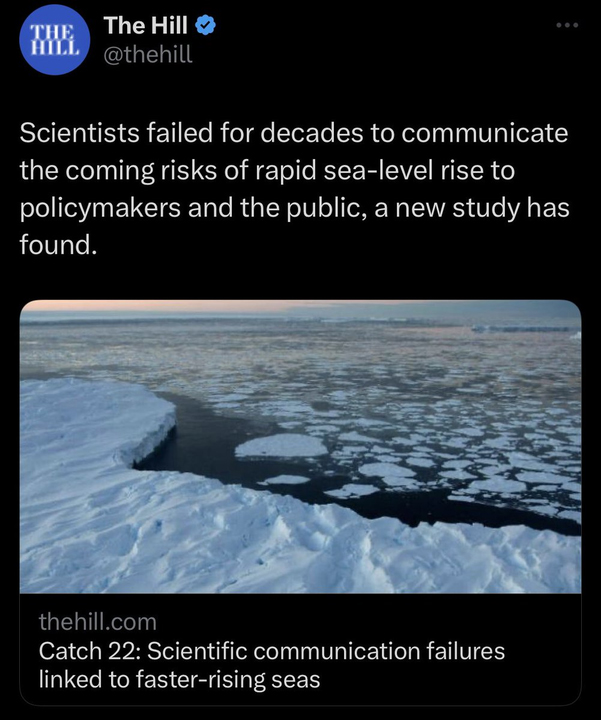A political news site recently accused scientists of failing to communicate the urgency of the climate crisis.
But the research they were covering falls far short of any such claims. Even worse, this kind of coverage actually distracts responsibility from where it should be placed. So what's the truth?
Covering a valid study that scrutinized the way past Intergovernmental Panel on Climate Change (IPCC) reports presented uncertainties, The Hill chose to tweet and open their article as follows:

To be fair, The Hill article eventually goes on to explain that the research paper does not actually go as far as claiming the scientists "failed for decades to communicate the coming risks of rapid sea-level rise".
The paper delves into the complexity of communicating uncertainty, specifically how the reports have handled aspects of sea-level rise that we lacked full understanding of.
"The challenge is that, for some of those processes we understand the physics quite well," explains Rutgers climate scientist Robert Kopp.
"For example, how the ocean takes up heat and expands in response to that – and so [we] can quantify and convey those risks. But other processes, particularly some of those acting on ice sheets, involve factors we don't understand that well and that are difficult to put into quantitative terms, but might nonetheless be able to cause rapid sea-level rise."
It is those latter ambiguities that proved tricky to explain. But Knopp and colleagues found that with experience, subsequent reports improved their navigation of these unknowns.
ScienceAlert has also published other scientists' criticisms of the IPCC reports; some are concerned the reports have been far too cautious. This may mean the extent of some of the more extreme yet less likely risks have been understated.
But oversimplifying some details of an extremely complex system while working towards improving it (which was exactly the aim of Kopp and team's study), and maintaining a consistent overall message about the direction we're heading is a far cry from failing to communicate the risks.
The IPCC was confident from their very first report in 1990 that "long-lived gases would require immediate reductions in emissions from human activities," regardless of the many remaining uncertainties.
Since then we've had an ocean rise of about 10 cm, which was exactly within their predicted range. The rise in sea levels is also accelerating just as predicted.
Yet, despite now being able to see how accurate the report's core messaging was, fossil fuel emissions continue to increase.
Framing it as a failure on behalf of the climate scientists detracts from those infinitely more culpable for our current situation, such as leaders who despite countless promises have failed to instigate significant action. And then of course there's big industry and the media.
ExxonMobil's own researchers were well aware of the threat posed by their actions by 1977.
Then they, along with the world's other most powerful companies, those by far the most responsible for the damage being done, intentionally supported many tactics, including disinformation campaigns to stall any action while continuing to squeeze maximum profit out of us for as long as possible.
The media has also been complicit in sabotaging climate communications. For much of recent history, mainstream media neglected to even mention the words climate change in instances where it was clearly relevant.
Then when they actually did bother to acknowledge the issue, they ended up providing more visibility to climate deniers than climate researchers, under the guise of 'balance'.
Sadly, the media situation is only set to keep deteriorating as social media and big tech companies erode specialist and independent journalism, making us utterly beholden to them for survival. Meanwhile they simultaneously allow their platforms to drown out climate content with orchestrated denier, troll and bot activities and further polarizing audiences with their algorithms.
Through all this, researchers around the world, across many disciplines, have continued to raise the alarm, over and over, with increasing urgency. Just as they have been doing since their early calls for action at the 1988 Toronto Conference on the Changing Atmosphere.
This is despite the fact that as far back as 1995, researchers who've dared to speak publicly about the climate crisis have received relentless harassment and even graphic death threats. Scientists now bravely risk being arrested during climate protests in their ever more desperate attempts to impart the gravity of the situation we're all now facing.
Pointing a finger at the very people who have worked the hardest to alleviate the climate crisis, is a complete betrayal of us all.
Opinions expressed in this article don't necessarily reflect the views of ScienceAlert editorial staff.
